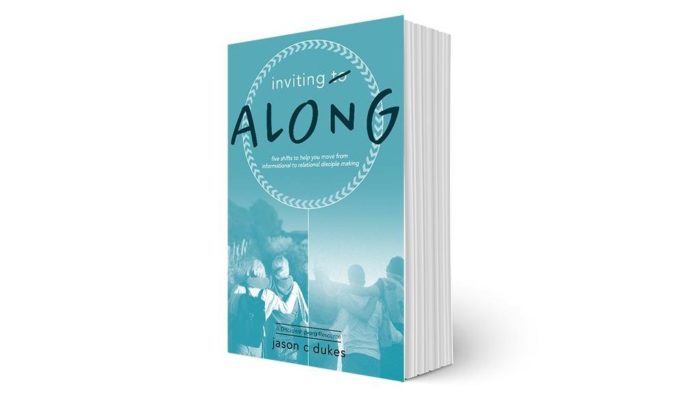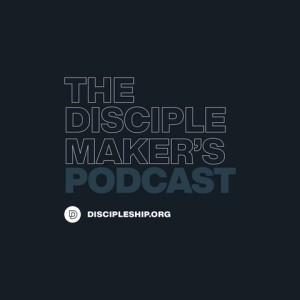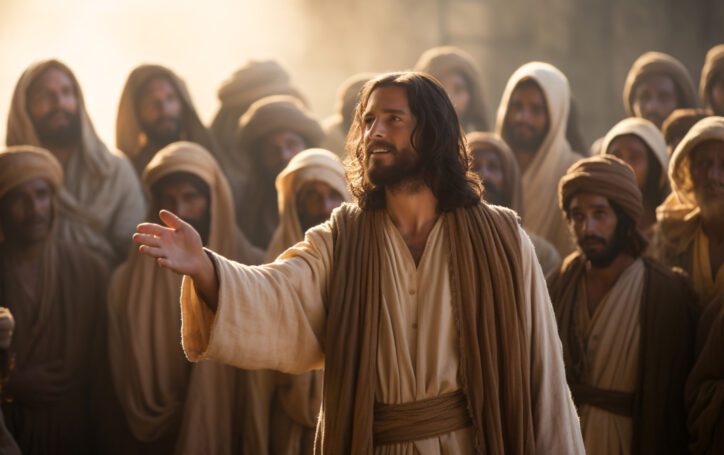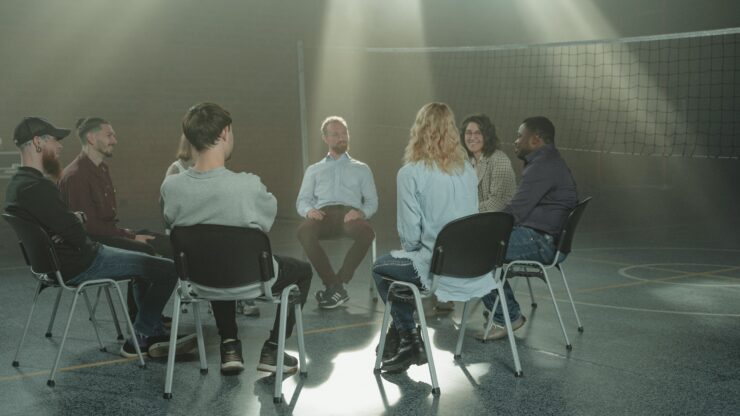Introducing the eBook “Inviting Along”


The following content is an excerpt from the eBook Inviting Along. Download your free digital version in your favorite format here.
My friend Denley once told me, “You can’t do discipleship in a class.” He said this with more than 30 years of disciple-making experience under his belt. He continued, “You can’t learn about following Jesus just from a curriculum. You have to do life together, relate to one another.”
He’s right, you know. Learning the ways of Jesus requires relationship. We need people with whom we can experience grace, forgiveness, reconciliation, service, meals, challenges, and renewed hope. Those of us in the church need to hear Denley’s assertion today loud and clear: disciple making is about inviting along believers and those who have yet to believe to discover the Gospel of the Kingdom with us in the context of relationship. This is different than inviting believers to something, as good as attendance to events, services, and activities can be. We need relationship, not just information for our discipleship efforts.
Jesus invited along His first followers to learn the Gospel of the Kingdom with Him by serving and eating together and relating to one another. Then, He sent them to invite along others into those same rhythms with the same goal in mind—to become disciples of Jesus who make disciples with Him.
That is, Jesus has invited us along to make disciples with Him, not just of Him. Instead of “inviting along,” I fear we have settled for “inviting to.” The problem is that we are trying to teach people the Gospel of Jesus’ Kingdom without relationally living the life of the Kingdom with them. We do something called “discipleship.”
But is that the same thing? Is the way we have done “discipleship”—so information driven rather than relationship driven—what Jesus intended when He commanded His followers to “make disciples” (Matt. 28:18-20)?
To get other disciple-making content like this—but in person—check out the National Disciple Making Forum and reserve your seat here.
When Jesus said to “make disciples” He meant something different than what we have accepted as “making disciples” and “discipleship.” What we have accepted looks less like learning the Gospel of the Kingdom in the context of relationship and more like learning about the Bible and how to obey its instructions—in isolation. While discipleship certainly affects our biblical knowledge and hopefully transforms our behavior, making disciples is much more than offering a Bible study in a classroom with academic curriculum. While discipleship is typically done in groups, these groups are not formed by welcoming relationships, but rather by enrolling attendees. While discipleship certainly maintains as one of its goals abundant life—which is what Jesus said He came to give—for the most part “discipleship” (as we have known it) has the goal of getting engaged church members and fulfilled religious people. While it might, in rare exceptions, involve someone who has yet to believe the Gospel of Jesus, “discipleship” as we have known it normally isn’t geared to involve the lost and those around us who are searching.
Don’t get me wrong. God is so gracious with all that we attempt to do for Him. He has used the way we have done “discipleship” over the years, no doubt, to transform and multiply many followers. The purpose of this book is not to deny the good results of those efforts. The purpose is, rather, to call us to consider the way Jesus made disciples in the context of everyday relationship rather than the ways we have made disciples in the context of our preferred religious forums.
This comes from the free eBook Inviting Along, which you can download here.
Being a disciple of Jesus who makes disciples with Him is not just one of the things we do as followers of Jesus; it is our identity. The Sent One declared us to be His sent ones (John 20:21). The One who cast His net for us said He would make His followers into fishers of men and women: “Follow me,” Jesus told them, “and I will make you fish for people” (Mark 1:17, CEB). The words from the original language are significant. Some translations have “make you to become” (KJV). This reveals that Jesus’ words are about identity. They can more woodenly be translated “come to exist.” In other words, Jesus offered to make us into different persons. These words describe who we are, or more appropriately, who we are becoming—perhaps even more appropriately, who Jesus is causing us to become.
Being a disciple of Jesus who makes disciples with Him is about an ongoing relationship. We make disciples of Jesus the way He made disciples—in the rhythms of the everyday. Although we cannot involve Bible study at all times—as if that were even necessary—learning still happens in the midst of everyday living. We can study about the commands of God and the teachings of Jesus, but a living Word comes alive through everyday life experiences with people. Our selfishness is usually not exposed and called to accountability in a lecture from a master teacher; rather, it is exposed and called to accountability in friendships that are centered on the Master Teacher. We learn enduring love, conflict resolution, gracious forgiveness, and compelling compassion in the midst of relationships—not in the midst of a classroom.
Making disciples, in my opinion, is learning and living the ways of Jesus together as believers in the context of relationship, while inviting along with us those who have yet to believe. We invite disciples and yet-to-be disciples along with us to serve, to eat, to learn, and to live with us. The “together” element includes those who are continuing to follow Jesus, who have just begun to follow Jesus, and who have yet to follow Him. “Discipleship” is not a post-conversion process, but a through-conversion-and-beyond process. It’s a “both-and” reality. Making disciples encompasses all of the stages of belief: yet to believe, believing, and continuing to believe—because we never quit learning Jesus and the Good News of His Kingdom.
How do we learn and live His ways? Well, as the church, it happens for us as we believe that God loves us and has come near to us. Believing His love, we then experience it as we take initiative to love one another as His church. Experiencing His love together, we are compelled together to take initiative to love those we encounter in our daily rhythms, as well as anyone the Spirit puts on our hearts (including our neighbors or even the nations around the world). We care deeply for other believers and are ever mindful of those around us who have yet to believe. We actively look for who welcomes us into their lives. Then we invite them along into our lives.
Let me take the pressure off by suggesting this: it would be more significant for you to make one disciple with Jesus—watching that person move from yet-to-believe to believing—over a period of three to five years, than it would be for you to share the Gospel message with ten strangers in the period of one week. Yes, it’s imperative that we are sensitive to the Spirit’s leading to share aspects of His Good News with the strangers we encounter. However, the story of Philip and the Eunuch in Acts 8 was an exception, not the norm, in the early church. And yet it has become the norm for how we have done evangelism over the last one hundred years.
Unfortunately, “stranger evangelism” (that is, sharing the Gospel with someone you’ve just encountered and having little to no relational context with them), as well as informational discipleship, tends to prohibit us from learning and living the ways of Jesus in relationship simply because we busy ourselves with “evangelism” and “discipleship” rather than with truly making disciples. Jesus never separated disciple making into the categories of discipleship and evangelism and missions like we tend to do. When we busy ourselves with “evangelism” and “discipleship,” we don’t create for ourselves the necessary margin to make disciples in the context of relationship with those who already believe as well as those who have yet to believe. Disciple making in the context of relationship is a much more active, take-initiative kind of life than when we busy ourselves with “stranger evangelism.” Why? Because we have to proactively and steadfastly love family and friends and neighbors and coworkers we’ve invited along. We have to lead with love first, rather than leading with a presentation first.
The One we follow loved us first. He didn’t wait for us to say we were sorry or ask for help. No, His love was and is proactive. He listens, looks, anticipates, and serves. That is what He did, and it’s why He didn’t hold tightly to the divine benefits He deserved (Phil. 2:4-8). Rather, He put on flesh and came near to declare His love for us.
If His church doesn’t love in this way, then we aren’t loving in the way He commanded us to love (John 13:34-35). But please remember that this is not about a service project or a mission trip. This is about rejecting what we have called “discipleship” and embarking on a journey together to make disciples.
Let’s be salt to bring out His taste, a shining light in the darkness. Let’s do these things together.
This is His intention and purpose for His church. Let’s make it our intention, too.
In this eBook I want to make the case that we must shift our disciple-making efforts from “inviting to” toward “inviting along” if we hope to make disciples as Jesus intended us to make them. My prayer is that this book will encourage and equip us to begin to think and live with a different understanding of “discipleship” as we know it—making it less informational and more relational—by following Him as He makes us to become disciples of Jesus who make disciples with Him, and as we invite along those who have yet to believe into everyday family-type relationships with us.
Written by Jason C. Dukes
Jason and Jen have been married since August 1998. They met at Union University in Jackson, Tennessee. Since August 2015, they have lived with their seven kids and yellow lab in the Nashville Tennessee area, where Jason coaches and equips disciples making disciples, churches starting churches, and churches renewing their intended purpose. Jason has helped start Westpoint Church, House Blend Cafe, the Reproducing Churches Network, and the Church of West Orange. He has also served as a student pastor, college pastor, lead pastor, and multiplication minister. Learn more about his writings at www.LiveSent.com.
If you have enjoyed reading this, please consider joining our email list!











